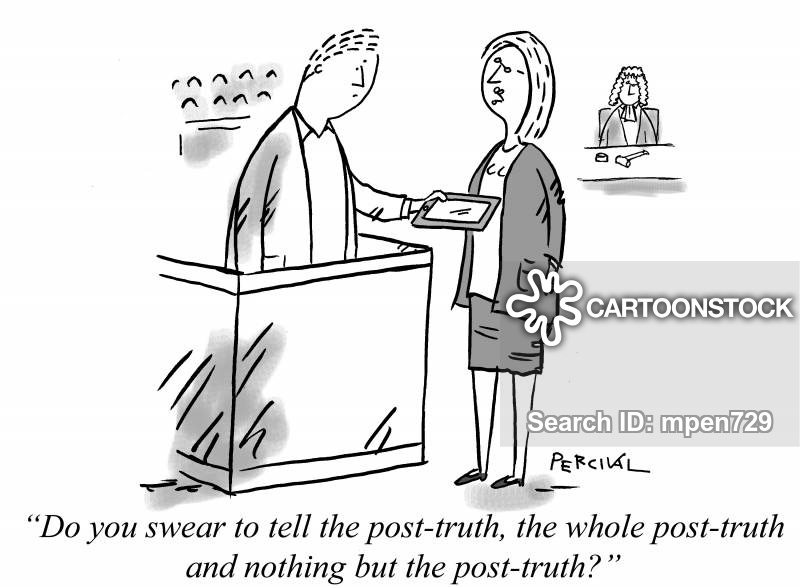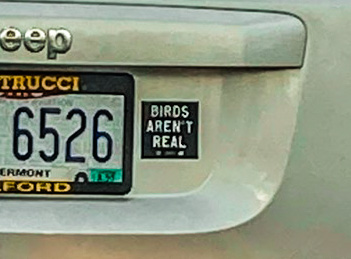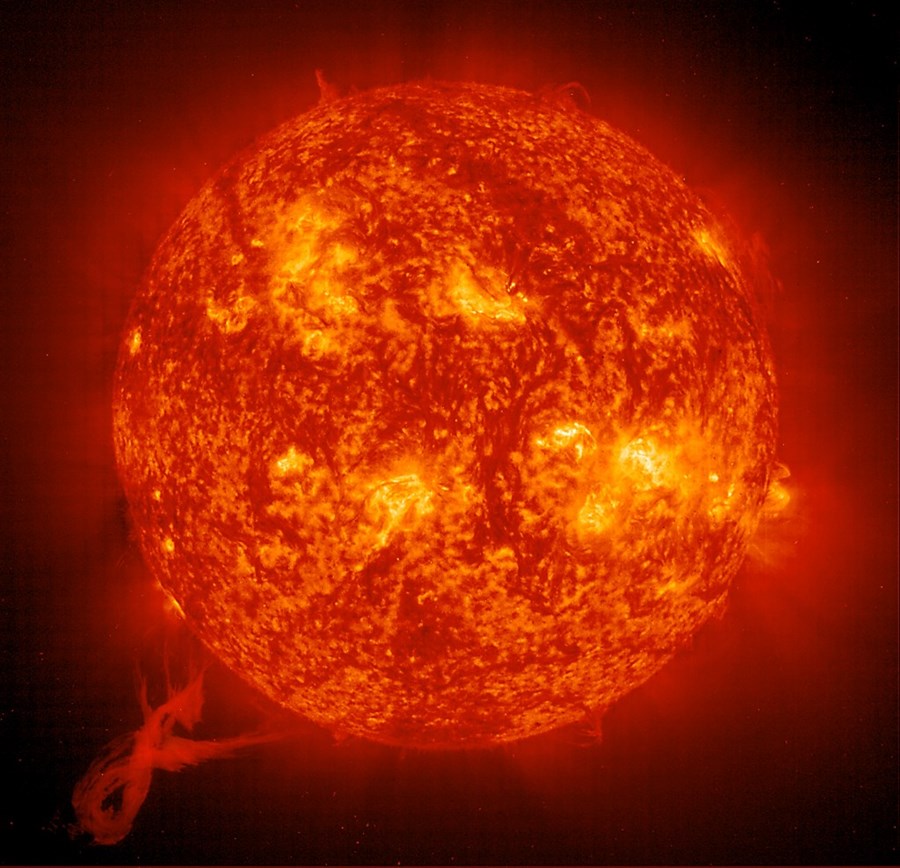“Everyone is entitled to his own opinion, but not to his own facts.”
Former US Senator, political scientist, and original neo-con, Daniel Moynihan
POST-TRUTH?
We keep hearing about the post-Truth era, not least from MacIntyre. But what does this term mean? Is the concept a useful category? Even if we are not totally in the “post” stage, what has happened in modern democracies–and in the US, in particular–that has made Truthtelling a problematic and controversial endeavor?
Or in the spirit of Moynihan’s observation, why should anyone’s opinions trump the pursuit of Truth? Thinking in terms of human psychology, why should people automatically assign truth claims to their feelings? Confusion about the pursuit of truth is everywhere in the US, from our catastrophically poor response to the Coronavirus pandemic to the denial of basic facts about issues, such as global climate change, racial inequality, and even the simplest scientific principles.

In this section, we will consider contending explanations of our contemporary crisis of Truth. It is not surprising that Truth has many pretenders who claim to be its parents. Yet, just like our relationships with family members, we are stuck with the people–or facts–that gave us life.
11. Tuesday, February 20: Are we in age of post-Truth? If so, what does a post-Truth age entail for people’s behavior?
Lee McIntyre begins the discussion of post-Truth with the following types of questions: Is post-Truth wishful thinking, political spin, mass delusion, bold-faced lying? Is it now possible to believe absolutely anything?
Lee MacIntyre, Post-Truth Read: Chapters 1 and 2
Jonathan Haidt, “Why it feels like everything is going haywire,” The Atlantic, November 12, 2019: PRINT AND READ
For our discussion, consider the philosopher René Girard’s condemnation of the denigration of truth-telling in the humanities departments of modern universities:
“We live in a world today, especially in the humanities, where the very notion of truth has become the enemy. The idea is you must have plurality. So, today, the interest of plurality takes precedence over the search for truth. You have to say ahead of time that you don’t believe in the truth. In most of the circles in which I move, decency is equated with a skepticism verging on nihilism”
– – Philosopher René Girard
Note: No one has a monopoly on Truth denial. Humanities departments are hardly bastians of right-wing thinking!
12. Thursday, February 22: Who’s to blame for this mess? Politicians, Damn Politicians!
Discussion Theme: The wave of populist politics that has swept across the liberal democratic world in recent years has many causes. One of the most prominent is the collision between elite domination and the demand for popular participation. Elites and ordinary citizens distrust and dislike each other with equal fervor. One of the primary manifestations of this conflict is the battle over Truth—what it is, who determines it, and whether it even matters.
Think Machiavelli! Was he on the money where our other thinkers failed?
Sophia Rosenfeld, Democracy and Truth A Short History, Chapter III
Andrew Higgens, “The Art of the Lie,” New York Times, January 10, 2010 PRINT AND READ
Also, for related ideas, look back at Lee MacIntyre, Post-Truth Read: Chapters 1 and 2.
13. Tuesday, February 27
Who’s to blame for this mess? Human beings, darn it!
In discussing the human contribution to Untruthtelling, let’s avoid the sin of presentism. As easy as it might seem to explain everything in terms of our current political climate, human beings have always had a tenuous relationship with the Truth. Regardless of the time or place, why do some many persist in their denial of simple facts or refuse to recognize clear contradictions in their own experiences. One possibility is that we are wired this way. Today, we will consider scientific theories about the psychological roots of denial.
The following articles draw upon arguments that are both similar and dissimilar. Which of the arguments are essentially the same? Which are different?
(Most of the articles and quotations are short).
Lee McIntyre, Post-Truth READ: Chapter 3
Albert Camus, “The Plague” (only two paragraphs, but read them closely since there’s a lot there) READ AND PRINT
Sara Garofalo, “The Psychology Behind Irrational Decisions” WATCH, READ, PRINT The text of this Ted Talk is on the right side of the page.
Rebecca Solnit, “Why Republicans Keep Falling for Trump’s Lies” PRINT AND READ I was initially not inclined to use this article because of the partisan title. However, when I read it, I couldn’t find much I disagreed with. Let me know what you think.
Daniel Dale, “We Like the President’s Lies,” The Star, March 26, 2017 PRINT AND READ
Thomas Edsall, “Why millions of Americans think it is Trump who cannot lie” PRINT AND READ
Recommended: Sara Garofalo, “The Psychology Behind Irrational Decisions” WATCH, AND READ The text of this Ted Talk is on the right side of the page.
Recommended: John Jerrim, et al., “Bullshitters: Who are they and what do we know about their lives?” Institute of Labor Economics, LOOK AT THE AUTHORS’ MAJOR FUNDINGS (don’t worry about the details).
Think about about the implications of Untruthtelling for our ability to build trust with others: How can you trust someone if you know they are lying to you? This behavior seems illogical. Still, it is quite common. Is this because trust isn’t necessarily based upon factual claims. If so, what is it based on? And will hard-cold facts ever be sufficient to undermine this kind of trust?

“Birds aren’t real, or are they? READ I’m afraid some of these “birds” are patrolling the Notre Dame campus
Another nefarious plot? HERE (Listen from 32:39 to 36:00)
14. Thursday, February 29:
Who’s else can we blame for this mess? The Corporate Merchants of Doubt!
Today, Truth-denial takes many forms, including the dismissal of the dangers of both global climate change and the Coronavirus. When I was growing up, Truth-denial took the form of denying the causal relationship between smoking and cancer. The tobacco industry playd the central role in propagating the myth that the “verdict was still out” on the connection—even though, its own scientists knew that the verdict was already in. Untold numbers of people died as result of a cause of cancer that we now recognize as self-evident.
Naomi Oreskes, Erik M. Conway, and Erik M. Conway, Merchants of Doubt : How a Handful of Scientists Obscured the Truth on Issues from Tobacco Smoke to Global Warming, Chapters 1 and 6 PRINT AND READ
Exxon scientists correctly predicted global warming decades ago and told the public otherwise:
“Assessing ExxonMobil’s Global Warming Projections”
Read as much of the article as you like. Make sure you look at the internal documents that Exxon scientists produced (and that the company hid and lied about)
And there are also “merchants of lies”:
Jeremy Peters and Katie Robertson, “Rupert Murdoch admits FOX news hosts endorsed election fraud lies”: READ
15. Tuesday, March 5:
NO CLASS
16. Thursday, March 7
And who else? It’s Americans and their strange attitude about scientists and science.
A final source of our Truth crisis may be quintessentially American. For reasons related to the social, cultural, and religious conditions of our nation’s founding, we, as Americans, may be culturally wired to resist scientific and intellectual authority.

Richard Hofstadter, Anti-Intellectualism in American Life
Read Chapter 3 and Chapter 6. They are both available on our Course Reserve site in Hesburgh Library PRINT AND READ
Nathan Gotsch, “People say, wow, that’s super extreme. No, it’s not”: What Micah Beckwith is telling GOP delegates to win them over” Beckwith PRINT AND READ
Does the earth really revolve around the sun? Evidently, it depends on whom you ask: READ
MID-TERM BREAK
March 9 – 16
*
OFFICE HOURS
Tuesdays 1:30 – 2:30
Wednesdays 2:00 – 4:00
2080 Nanovic Hall
Visit me!
CONTACT ME
amcadams@nd.edu
MY INTERESTS
Here